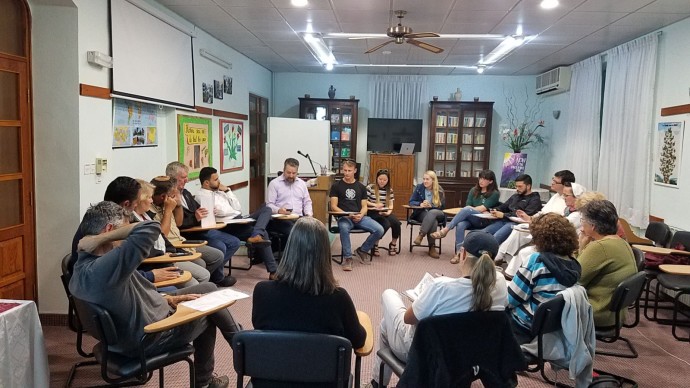Jews and Christians will take a five-day hike and ascend together to Jerusalem as part of a special program that will take place during the preparation period for Passover and Easter.
The hike, organized by Dr. Faydra Shapiro, executive director for the Israel Center for Jewish-Christian Relations in Tiberias, will take place April 6-10, departing from Emmaus Nicopolis (Latrun Junction) and arriving at Mt. Zion on Palm Sunday (Western church) at dawn. The program will include a communal Sabbath on what the Jews refer to as Shabbat HaGadol, the Sabbath directly preceding the pilgrimage festival of Passover.
“We will be walking, learning, singing, engaging together, in preparation for the celebration of our respective holy days of Pesach and Easter,” Shapiro told The Jerusalem Post. “We have a group of about 25 people coming together for this: Jews, Catholics and Protestants. The group includes religious Jews, priests, nuns and ministers, and young men and women from Israel, Palestine and overseas.”
Shapiro sees this as a grassroots initiative and not as a training session.
“It's important to us that this not be for Jewish-Christian relations ‘professionals’ or tour guides,” Shapiro said. “The event was designed for regular people to enter deeply into the Jewish-Christian relationship.”
The program includes two full days of hiking, followed by Shabbat together. The final leg will begin as Shabbat ends on Saturday night with a hike from Ein Kerem to Mount Zion. The arrival on Mount Zion is scheduled to coincide with the dawn.

The Shabbat will be held in the pilgrims’ house in St. John in Montana Franciscan Monastery in Ein Kerem.
“While I imagine we aren't the first people to celebrate Shabbat in a monastery, it's a beautiful opportunity to do so and to remember all that is possible between us,” Shapiro said.
Though Jews and Christians tend to be deeply involved in their own respective holidays at this time, Shapiro sees the holidays as a unique time for devotion that can unite.
“Pesach is an event that both connects and divides Jews and Christians,” Shapiro said. “We want to dive into that space and explore it together, recognizing that as people who seek holiness through our own traditions, acknowledging that we have much to share and learn from one another. This year Pesach and Pascha [Easter] fall together. We will explore what they have to do with each other.”
For the Jews, there is a biblical mandate to ascend to Jerusalem in order to bring the paschal lamb to the Temple, a commandment that, unfortunately, is not currently performed. But for believers in Jesus, the route is no less important.
“The road from Jerusalem to Emmaus is so significant for Christians, and the appearance of the resurrected Jesus to two disciples who are on their way, as depicted in Luke 24,” Shapiro explained. “But we tend to forget that following this mind-blowing experience, the disciples return to Jerusalem with great joy, straight to the Temple (Luke 24:52-53).”
Shapiro believes that this type of gathering is the key to building bridges.
“You know, so much of Jewish-Christian relations is based on short events: conferences, conversations, volunteering,” Shapiro said. “And those are great. But they are also a bit limited. This pilgrimage allows us a beautiful chunk of time together, where we can go deeper in our engagement.
“The goal is to give us time together, real quality time together, to hike, to learn, to eat, to celebrate, to disagree, to laugh, to help one another up the steep bits. We will only learn how to walk together by actually walking together, as we are,” she said.
A small pilot project was run in 2019 to see if it was possible and valuable.
“The effect was electrifying,” Shapiro said. “Conversations went on deep into the night. Jews and Christians gave divrei Torah [Torah commentary] at the Shabbat meals, gentle arguments were had, new friendships were built. By the time we got to Mt. Zion at dawn, we knew we had received new eyes that allowed us to see the Jerusalem of the future.”
Shapiro described it as a manifestation of Isaiah’s prophecy:
"And many peoples shall go and say: 'Come and let us go up to the mountain of the Lord, to the house of the God of Jacob; and He will teach us of His ways, and we will walk in His paths" (Isaiah 2:3).
“There wasn't a dry eye among us when we arrived at Mount Zion,” Shapiro said.
The program was pushed off after that due to the pandemic and Shapiro said that this year is still difficult, both because of COVID and becuase of the recent terror attacks. Palestinian participants need special permits to come into Israel from Judea and Samaria.
“This year is especially fraught given the unstable security situation,” Shapiro explained. “I never expected to be helping to arrange permits for Palestinian Christian participants to enter Israel and also hiring an armed guard to accompany us on the same day. Terror knows no religion or ethnicity.”
The pilgrimage is the work of the Israel Center for Jewish-Christian Relations, with generous support from Passages Israel and the Philos Project.
